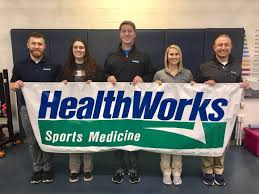
Article reposted from The Dominion Post
Authors: CARLY CONTRAGUERRO AND SEAN MANNING
They’re at every high school sporting event in the area, six days a week for hours at a time. They’re always there, but always go unnoticed — the athletic trainers at Morgantown, University and Clay-Battelle high schools.
March is a time to recognize the hard work trainers put in to keep student athletes safe and healthy on and off the field. National Athletic Training Month is used to help promote what athletic trainers regularly and to show outsiders the responsibilities they share to keep athletes safe from serious injury.
Under the direction of physicians, athletic trainers work to prevent and treat injuries to bones and muscles, as well as sports-related illnesses, such as asthma and heat stroke.
Some of the more serious injuries include those to the brain and spinal cord. Athletic trainers are equipped to treat those on the spot, while also being able to handle acute injuries, like broken bones or torn muscles.
Trainers also keep inhalers with them for athletes with asthma and work closely with those who have diabetes.
Today, concussion protocol is a hot topic, with many retired professional athletes speaking on the complications they now have as a result of head injuries during their playing days. In high school, athletic trainers manage whether an athlete is ready to go back into a game, and help teach coaches and parents about the signs and risks.
All trainers must be CPR certified every two years and must have an accredited bachelor’s program under their belts, while about 70 percent end up getting a master’s degree.
Part of that 70 percent includes the trainers in Monongalia County — two at MHS, two at UHS and one at C-B.
Luke Klawiter, of Jenison, Mich., has been at MHS for two years, working as an athletic trainer while finishing a two-year athletic training graduate program at WVU.
Klawiter said his number one responsibility is playing an vital role in keeping players healthy — which exemplifies the National Athletic Training Association’s 2017 slogan, “Your protection is our priority.”
“Their success is my success,” Klawiter said. “When athletes come back from an injury or look toward me for support getting through one, it gives me that internal satisfaction.”
Klawiter arrives at MHS before the school day ends and stays until the night is done. Whether he is addressing new and existing injuries or setting up water and emergency equipment, Klawiter stays prepared to act quickly for any scenario.
As he enters his last sports season with MHS, Klawiter reflects on his learning experience, and finding support from not only players and coaches, but from the community as well.
“The past two years I have learned more than I expected or could have wished for,” Klawiter said. “Being at a (Class) AAA school with many teams, I have seen many injuries and worked with many different athletes, coaches and parents. This learning environment is the best I could have asked for and I am thankful for what it has taught me.”
Kelsey Ulrich, a Reading, Pa., native, is a graduate student at WVU, working in her second year of a two-year program in athletic training. She has been at UHS both years, working with all sports team — from preseason conditioning to the end of the postseason.
Typical work days are from 2-10 p.m. with games and practices — being the first one there and the last to leave. The program includes paid tuition and a stipend with the help of the Monongalia County Board of Education and HealthWorks.
“I grew up playing many different sports and I love learning about the body,” Ulrich said. “Athletic training combined those two elements for me. Medicine is always changing, so we are constantly leaning newer and better ways to treat athletes, which is very exciting.”
Sam Buscher, of Pontiac, Ill., has helped with the Cee-Bees the last two years. He came to WVU after finishing his undergrad at James Madison. Getting hurt in high school led him in the direction of becoming a trainer.
“I’ve always been passionate about sports and have been drawn to medicine since I was young,” he said. “In high school, after suffering an ankle injury, I knew I wanted to become an athletic trainer. It gives me the opportunity to build lasting relationships with my community, co-workers and patients.”
Brian Hanson (UHS), of Mukwonago, Wis., and Cory Hester (MHS), of Aurora, Colo., are in their first year with the program. Hanson came to WVU from Wisconsin-Madison, while Hester went to Ithaca (N.Y.) College.
All five help at Trinity Christian School, as well as with the Morgantown Marathon, Mountain State Youth Football League, the Winner’s Choice Wrestling tournament and the Mon County Middle School Lacrosse League.